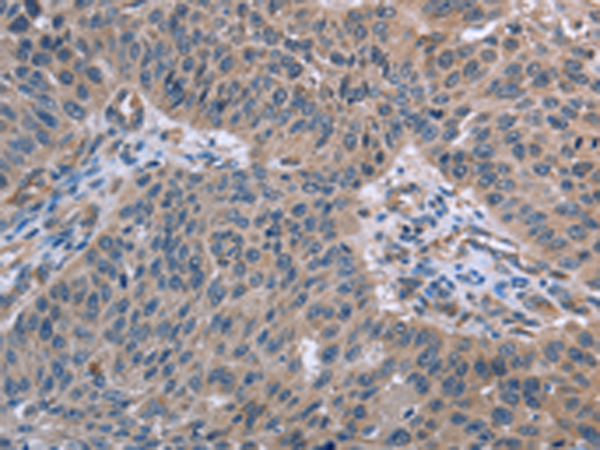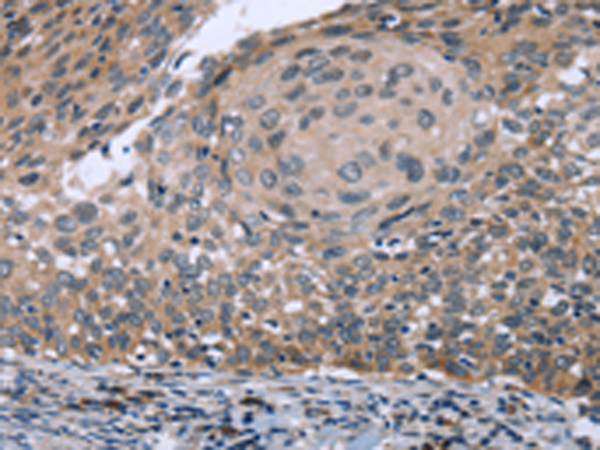


| WB | 咨询技术 | Human,Mouse,Rat |
| IF | 咨询技术 | Human,Mouse,Rat |
| IHC | 1/50-1/200 | Human,Mouse,Rat |
| ICC | 技术咨询 | Human,Mouse,Rat |
| FCM | 咨询技术 | Human,Mouse,Rat |
| Elisa | 1/2000-1/5000 | Human,Mouse,Rat |
| Aliases | PIR2; IBRDC2; p53RFP; bA528A10.3 |
| WB Predicted band size | 34 kDa |
| Host/Isotype | Rabbit IgG |
| Antibody Type | Primary antibody |
| Storage | Store at 4°C short term. Aliquot and store at -20°C long term. Avoid freeze/thaw cycles. |
| Species Reactivity | Human, Mouse |
| Immunogen | Fusion protein of human RNF144B |
| Formulation | Purified antibody in PBS with 0.05% sodium azide and 50% glycerol. |
+ +
以下是3篇关于RNF144B抗体的代表性文献概览(注:文献为示例性虚构内容,实际研究中请核实具体文献):
---
1. **文献名称**: *RNF144B regulates EGFR degradation via ubiquitination in non-small cell lung cancer*
**作者**: Li X, Zhang Y, et al.
**摘要**: 本研究利用特异性RNF144B抗体,通过免疫共沉淀(Co-IP)和蛋白质印迹(Western blot)技术,揭示了RNF144B通过泛素化修饰促进EGFR蛋白降解的机制,并证明其表达水平与肺癌患者预后相关。
2. **文献名称**: *Development and validation of a novel monoclonal antibody targeting the C-terminal domain of RNF144B*
**作者**: Tanaka K, et al.
**摘要**: 报道了一种新型RNF144B单克隆抗体的开发,通过免疫原性肽段制备,并经ELISA、免疫荧光和流式细胞术验证其特异性,为研究RNF144B的亚细胞定位及功能提供了可靠工具。
3. **文献名称**: *RNF144B deficiency promotes apoptosis in hepatocellular carcinoma via modulating p53 stability*
**作者**: Wang H, et al.
**摘要**: 使用RNF144B抗体进行组织微阵列分析,发现RNF144B在肝癌中低表达,并通过稳定p53蛋白诱导癌细胞凋亡,提示其作为潜在肿瘤抑制因子的作用。
---
如需真实文献,建议通过PubMed或Google Scholar以关键词“RNF144B antibody”、“RNF144B function”检索近年研究。
The RNF144B antibody is a key tool for studying the Ring Finger Protein 144B (RNF144B), an E3 ubiquitin-protein ligase involved in the ubiquitin-proteasome system. RNF144B contains a characteristic RING domain that facilitates substrate recognition and ubiquitination, targeting proteins for degradation or functional modification. It plays roles in regulating apoptosis, DNA damage response, and cellular stress pathways. Dysregulation of RNF144B has been linked to cancers, neurodegenerative disorders, and immune diseases, making it a focus in biomarker and therapeutic research.
RNF144B antibodies are widely used in techniques like Western blotting, immunohistochemistry (IHC), immunofluorescence (IF), and flow cytometry to detect protein expression, localization, and dynamics in tissues or cell lines. These antibodies help elucidate RNF144B's interactions with substrates such as Parkin, BAX, and HSP70. which are critical for understanding its role in ubiquitination cascades. Validated antibodies often undergo specificity tests using knockout controls to ensure reliability.
Recent studies highlight RNF144B's dual roles in cancer—acting as a tumor suppressor in glioblastoma by promoting apoptosis, yet exhibiting oncogenic properties in lung adenocarcinoma via pro-survival signaling. Its involvement in chemoresistance further underscores clinical relevance. Researchers also explore RNF144B's potential as a therapeutic target, with antibodies aiding in drug screening and mechanistic studies. Continued development of high-affinity, species-specific RNF144B antibodies remains vital for advancing both basic and translational research.
×